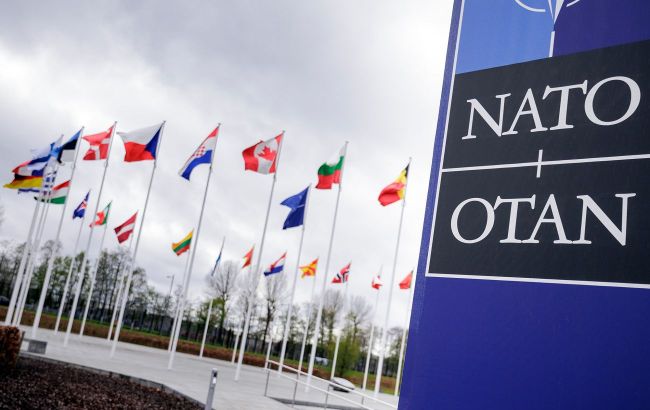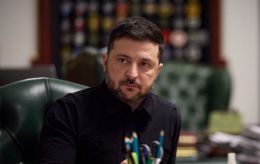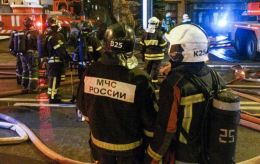US and Germany oppose start of Ukraine's NATO talks
 US and Germany oppose start of Ukraine's NATO talks at the summit (Getty Images)
US and Germany oppose start of Ukraine's NATO talks at the summit (Getty Images)
Ukraine's aspirations for an official invitation to join NATO face hurdles as Washington and Berlin stand against initiating negotiations during the Alliance summit planned for July, according to NYT.
According to the article, NATO is reluctant to admit a new member who could, through the alliance's collective security agreement, drag the Alliance into the largest land war in Europe since 1945.
This has led NATO to seek a middle ground, such as a form of membership significant enough to show long-term support for Ukraine, as expressed by NATO Secretary-General Jens Stoltenberg this week.
High-ranking Western diplomats participating in discussions find it unclear what this middle ground might entail. Proposals put forward this week at the meeting of foreign ministers in Brussels regarding NATO assuming greater control over coordinating military assistance, funding, and training for Ukrainian forces were met with skepticism.
"The United States and Germany remain opposed to offering Ukraine a start to membership negotiations in Washington as they did at last year’s summit in Vilnius, and they want that issue off the table in July, despite a similar process at the European Union that was approved last winter," the NYT says.
However, the focus remains on providing Ukraine with specific commitments it can fulfill.
"Efforts to clearly define what conditions Ukraine needs to meet to begin talks with NATO have yet to move forward," NYT specifies.
None of these matters will be significant until July if Russia continues to gain ground and Ukraine faces the threat of losing the war. This perspective becomes increasingly realistic each month as Republicans in Congress continue to block a $60 billion aid package.
"The situation on the ground may look a lot worse than it is today, and then the real question becomes, 'How do we make sure that Russia doesn’t win?'" said Ivo H. Daalder, former US ambassador to NATO.
Meanwhile, Ukrainian Foreign Minister Dmytro Kuleba stated that he "listened carefully" to discussions among his diplomatic colleagues on how NATO can address Ukraine's position in the Alliance.
"It is up to allies themselves to decide on the form and the content of the next step toward Ukraine’s membership in NATO. We will be looking forward to the outcome, but, of course, we believe that Ukraine deserves to be a member of NATO and that this should happen sooner rather than later," he said.
Stoltenberg's proposals
NATO Secretary-General Jens Stoltenberg presented two proposals at this week's meeting aimed at extending support to Ukraine, which he hopes will be approved during the NATO heads of state meeting in Washington at the Alliance summit in July.
The first proposal, which suggests that NATO, rather than the United States, should be responsible for coordinating donations and arms supplies to Ukraine, faced objections from Hungary and other allies, as it could directly involve the Alliance in the war. The United States also opposes this, according to Daalder, although the Biden administration has so far refrained from publicly criticizing it. On Thursday, US Secretary of State Antony Blinken touched on this issue, only praising the current process under US leadership for its "extraordinary results."
The second proposal—to provide Ukraine with $100 billion in assistance over five years—was met with ambivalence, as It is unclear how NATO can compel its member countries to contribute, especially considering budgetary or political constraints, similar to the situation with providing aid to Ukraine in the US Congress.
However, Stoltenberg argued that such plans are crucial to ensuring that Ukraine continues to receive consistent NATO support rather than sporadic donations. He welcomed recent deliveries of drones, missiles, armored vehicles, and ammunition from the United Kingdom, Czechia, Finland, France, and Germany.
Stoltenberg added that NATO's Supreme Allied Commander Europe, US Army General Christopher Cavoli, has been tasked with developing a plan to provide reliable and predictable assistance to Ukraine for years to come.
"If NATO allies deliver what we should, then we are absolutely confident that the Ukrainians will be able to make new gains. That’s the reason why we must deliver more, why allies need to dig deeper and provide more military support faster and why we also need stronger and more robust structures for the long haul," the secretary-general said.
Subtext for urgency
The subtext of this urgency, as NYT writes, is NATO's desire to "Trump-proof" - as it has been termed in recent months - Western support for Ukraine in case former President Donald Trump is re-elected in November.
On Thursday in Brussels, US Secretary of State Antony Blinken stated that he heard "from ally after ally" that "our commitment, our engagement, is indispensable for this alliance" and its support for Ukraine. He said Ukraine is working on government and security reforms necessary for NATO membership and, without providing details, mentioned various efforts within the Alliance aimed at offering new guarantees to the war-torn country when leaders meet in Washington in July.
However, his comments suggest that the world should not expect a sharp departure from the status quo.
"These conversations over the last couple of days have been focused on exactly what we’re going to do at the summit. We’ve begun a process among all the countries and with all the experts to flesh that out. We’ll be using the time between now and the summit to do exactly that," Blinken said.
NATO summit
The NATO Summit in Washington, scheduled from July 9 to 11, 2024, in the US capital, Washington, is dedicated to the Alliance's 75th anniversary. The summit was officially proposed in 2023 during the NATO Summit in Vilnius.
Previously, US Secretary of State Antony Blinken said that the United States expects to discuss the development of a "roadmap" for Ukraine's NATO membership at the Alliance summit scheduled for July 9-11 in Washington.

